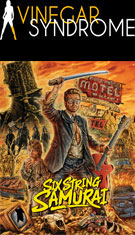



 latter half of the '90s was absolutely stuffed with would-be cult movies
latter half of the '90s was absolutely stuffed with would-be cult movies  vying to catch on with young arthouse-going moviegoers who had made superstars out of the likes of Quentin Tarantino and Robert Rodriguez, who had made referential moviemaking a new kind of spectator sport in the wake of Pulp Fiction, Reservoir Dogs, and El Mariachi. That meant a lot of films got lost in the shuffle with screens jammed with films like 2 Days in the Valley, The Boondock Saints, Freeway, Killing Zoe, and so on, though all built up admirers to one degree or another. One of the most colorful and eccentric of these was Six-String Samurai, which rode a huge wave of buzz after an ecstatic debut at Slamdance but never quite took off during its release from Palm Pictures (who was really gunning for cult credibility around this time with The Basketball Diaries and Ghost in the Shell). A hodgepodge of references with overt nods to El Topo, The Road Warrior, Lone Wolf and Cub, The Wizard of Oz, and multiple music acts, the film is divisive by nature but has managed to keep up a certain level of fan awareness over the past 23 years in spite of being treated very poorly on video with only a mediocre non-anamorphic release in 1999 representing it on the DVD market. In 2021, Vinegar Syndrome swung the other direction with a vengeance by giving the film a lavish UHD and Blu-ray special
vying to catch on with young arthouse-going moviegoers who had made superstars out of the likes of Quentin Tarantino and Robert Rodriguez, who had made referential moviemaking a new kind of spectator sport in the wake of Pulp Fiction, Reservoir Dogs, and El Mariachi. That meant a lot of films got lost in the shuffle with screens jammed with films like 2 Days in the Valley, The Boondock Saints, Freeway, Killing Zoe, and so on, though all built up admirers to one degree or another. One of the most colorful and eccentric of these was Six-String Samurai, which rode a huge wave of buzz after an ecstatic debut at Slamdance but never quite took off during its release from Palm Pictures (who was really gunning for cult credibility around this time with The Basketball Diaries and Ghost in the Shell). A hodgepodge of references with overt nods to El Topo, The Road Warrior, Lone Wolf and Cub, The Wizard of Oz, and multiple music acts, the film is divisive by nature but has managed to keep up a certain level of fan awareness over the past 23 years in spite of being treated very poorly on video with only a mediocre non-anamorphic release in 1999 representing it on the DVD market. In 2021, Vinegar Syndrome swung the other direction with a vengeance by giving the film a lavish UHD and Blu-ray special  edition, and no matter how you feel about the film itself, there's no denying that watching this in 4K makes for one hell of a home
edition, and no matter how you feel about the film itself, there's no denying that watching this in 4K makes for one hell of a home  theater showcase.
theater showcase.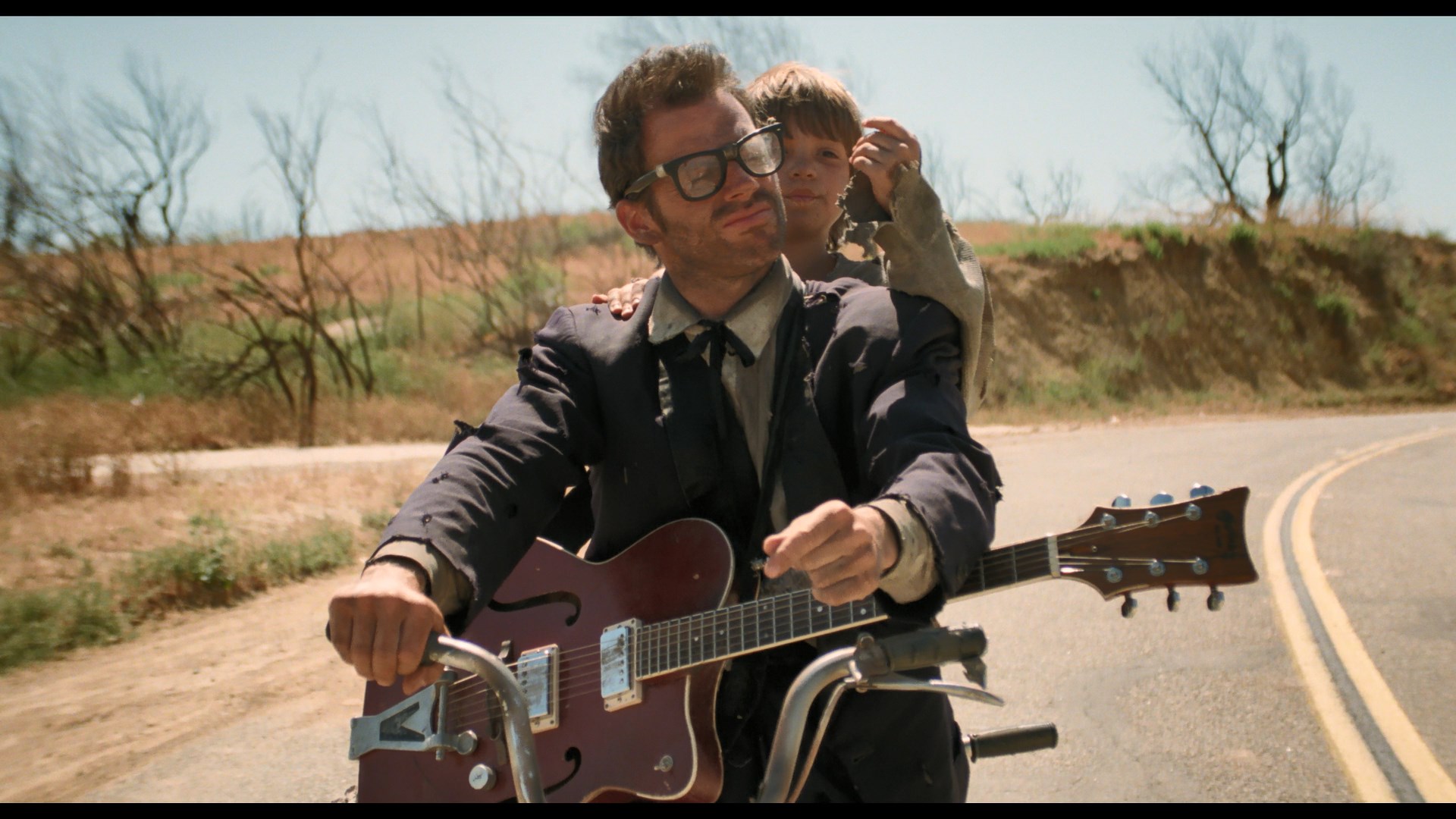 to the
to the 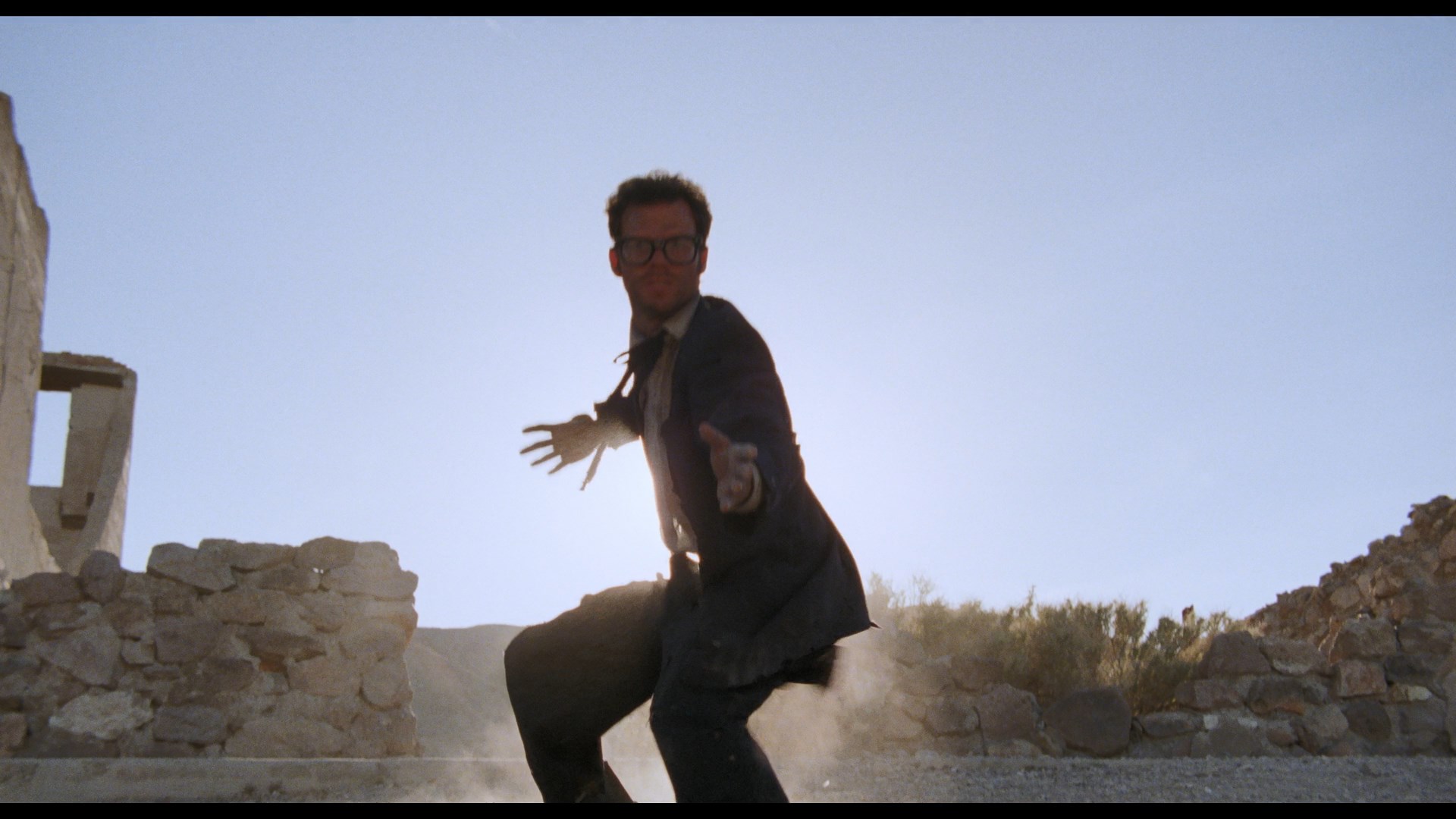 fact that everyone seems to be directed to speak like they're doing a dubbed kung fu movie. It's an affected choice among many that don't always work (the inconsistent anamorphic squeezing in the opening is another distraction), but there's enough sincerity and energy to still make it appealing if you're on the same wavelength. It also helps if you're a fan of the Red Elvises since they take up the vast majority of the soundtrack and turn up on screen through the running time as a kind of musical Greek chorus, though there's also a gorgeous score by Brian Tyler before he went on to glory with Bubba Ho-Tep, Rambo, and multiple Marvel films.
fact that everyone seems to be directed to speak like they're doing a dubbed kung fu movie. It's an affected choice among many that don't always work (the inconsistent anamorphic squeezing in the opening is another distraction), but there's enough sincerity and energy to still make it appealing if you're on the same wavelength. It also helps if you're a fan of the Red Elvises since they take up the vast majority of the soundtrack and turn up on screen through the running time as a kind of musical Greek chorus, though there's also a gorgeous score by Brian Tyler before he went on to glory with Bubba Ho-Tep, Rambo, and multiple Marvel films. 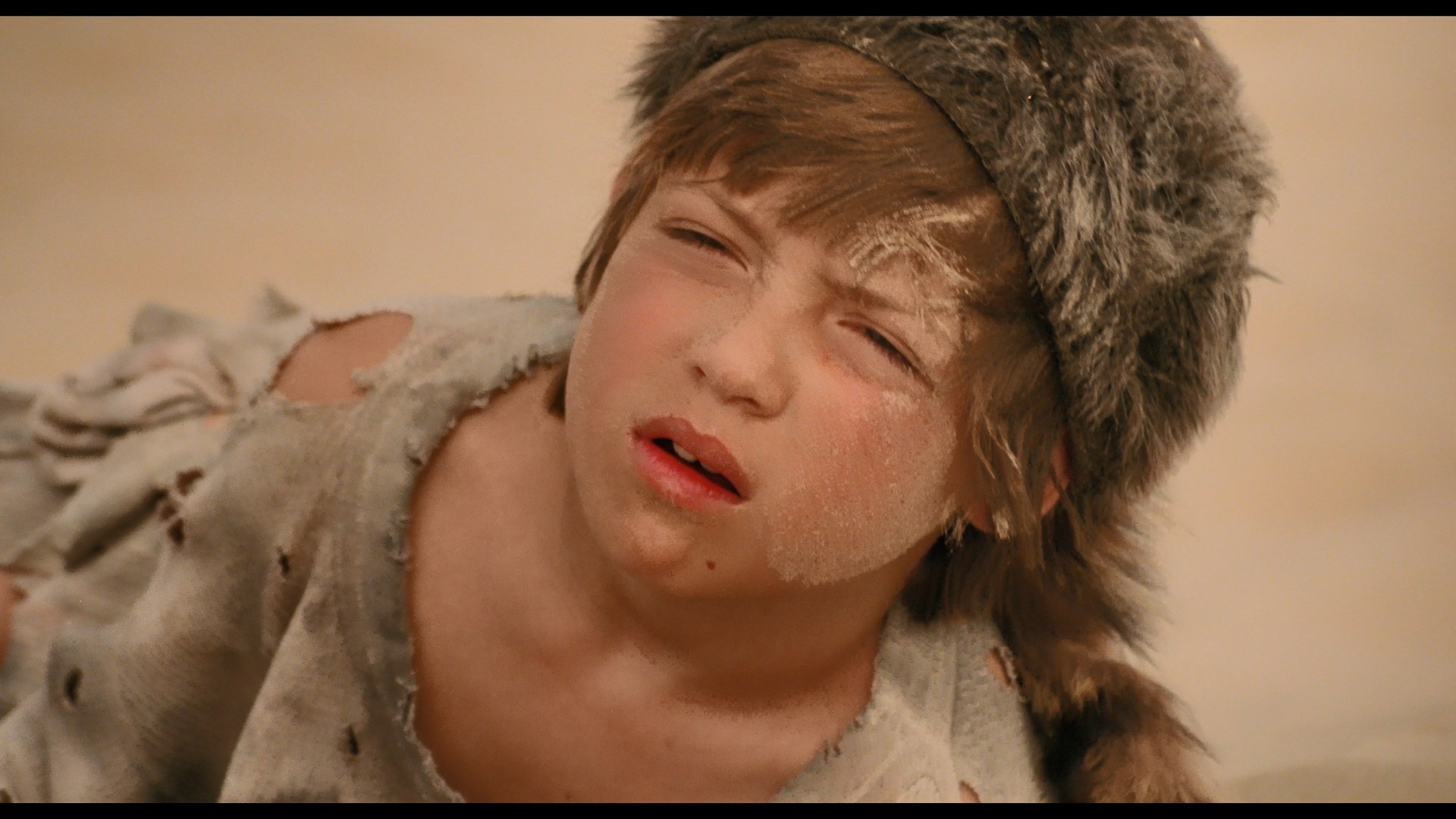 SDH
SDH 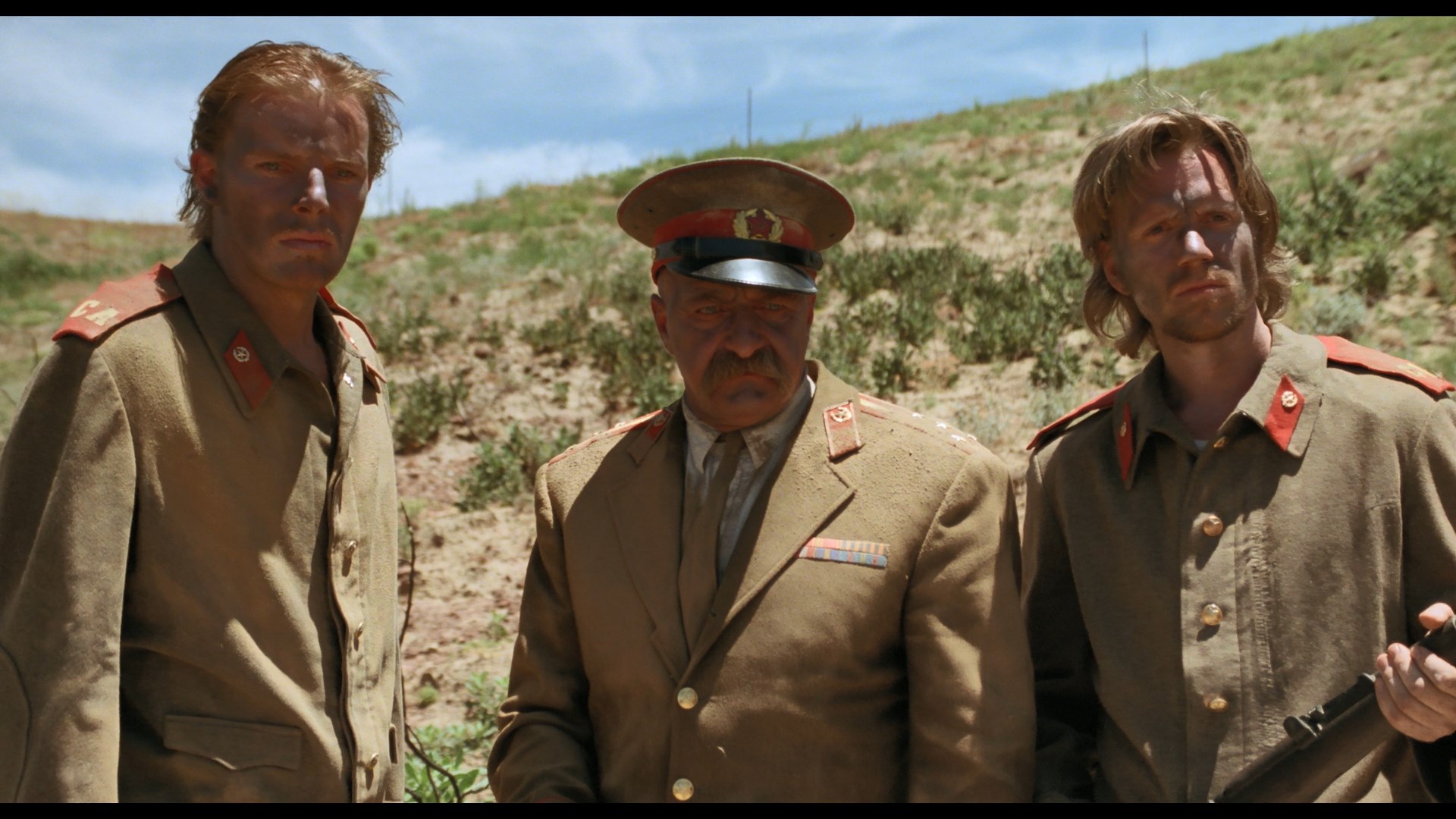 subtitles are provided. This also marks the label's second VSU release after The Beastmaster, meaning it comes in a sturdy and visually striking magnet clasp box (designed by The Dude Designs) with the two-disc set inside in a slipcover also coming with a 40-page book featuring a director's statement and filming essay.
subtitles are provided. This also marks the label's second VSU release after The Beastmaster, meaning it comes in a sturdy and visually striking magnet clasp box (designed by The Dude Designs) with the two-disc set inside in a slipcover also coming with a 40-page book featuring a director's statement and filming essay.  participants for live virtual interviews. The result is actually really warm and charming as he converses with Bernier,
participants for live virtual interviews. The result is actually really warm and charming as he converses with Bernier,  Tyler, The Red Elvises, producer Leanna Creel, first assistant director David Riddick, former Panavision marketing executive Tracy Morse, and executive producer Michael Burns, with a split-screen approach that works better than the Zoom calls we've been seeing for the past year or so. It's great stuff as they go through the script process, storyboarding, coming up with the pseudo-dubbed dialogue approach since they weren't shooting with sync sound, shooting in Death Valley, and tons more. Note that for some reason this is divided into separate files (20m23s, 21m23s, 17m53s, 16m27s) that should play consecutively, though at least on one Oppo used for this review, it bounced back to the menu after the first segment -- so chapter skip if you must to make sure you see the whole thing. Also included is Mungia's 1996 short "A Garden for Rio" (15m8s) about an elderly couple's life-changing quest to start a garden, presented here in a nice HD film scan, plus an extensive behind the scenes gallery (6m55s).
Tyler, The Red Elvises, producer Leanna Creel, first assistant director David Riddick, former Panavision marketing executive Tracy Morse, and executive producer Michael Burns, with a split-screen approach that works better than the Zoom calls we've been seeing for the past year or so. It's great stuff as they go through the script process, storyboarding, coming up with the pseudo-dubbed dialogue approach since they weren't shooting with sync sound, shooting in Death Valley, and tons more. Note that for some reason this is divided into separate files (20m23s, 21m23s, 17m53s, 16m27s) that should play consecutively, though at least on one Oppo used for this review, it bounced back to the menu after the first segment -- so chapter skip if you must to make sure you see the whole thing. Also included is Mungia's 1996 short "A Garden for Rio" (15m8s) about an elderly couple's life-changing quest to start a garden, presented here in a nice HD film scan, plus an extensive behind the scenes gallery (6m55s). ![]()